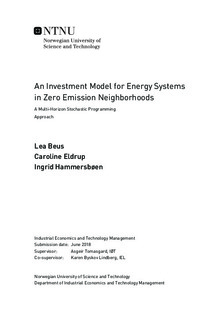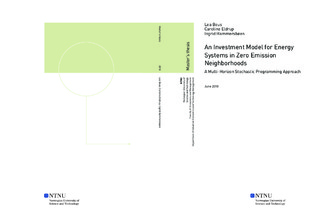| dc.description.abstract | This thesis studies an optimization problem regarding investment planning of energy systems in ZENs, and suggests a two-stage multi-horizon stochastic programming approach. It aims to provide a useful decision tool for developers in ZENs, in addition to a model that may be used as a neighborhood module in EMPIRE.
The main objective is to find cost-optimal investment decisions of which capacities of different energy technologies that should be installed in each investment period, while considering the optimal operation of the energy system. Technologies included in the model are district heating, ST-collectors, PV-panels, heat pumps, electric boiler, bio boiler, gas boiler, combined heat and power, heat storage and battery. The high number of included technologies is one of the contributions of the model. Especially the inclusion of combined heat and power and storage technologies for \emph{both} heat and electricity, facilitating load shifting, is important to emphasize. With the use of feed-in-tariffs, the option of exporting electricity is also implemented.
Another important contribution of this work is the integrated optimization of \emph{both} strategic investments and the operation of the energy system, while taking operational uncertainties in PV and ST generation, electricity and heat demand, and electricity and district heating prices into account. The uncertainty is proposed modeled with a multi-horizon information structure, separating the operational and strategic investment horizons of the problem. Accompanied by the proposed scenario generation method, which has proved to be very stable for a number of problem instances, the complexity of the problem is considerably decreased.
An extensive case study of the pilot project Ydalir is also provided, demonstrating and validating the model. The practical analysis emphasizes the behaviour of the model and the considerations that should be taken into account.
This thesis also includes a comprehensive literature review covering research studying strategic and/or operational decision making within energy systems on both small and large scales. To our knowledge there does not exist many studies considering ZENs in particular, implying that the study may be a valuable contribution to the research area. | en |

